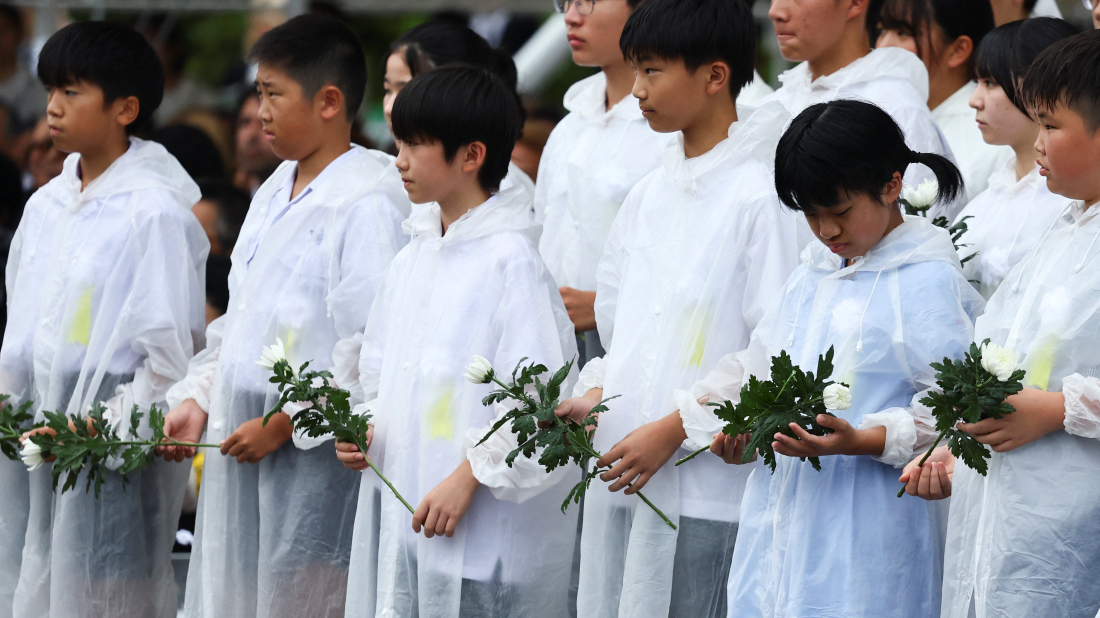Trump says additional talks with Iran expected on Friday
Tensions between the U.S. and Iran are escalating, with Washington ordering a significant military build-up in the region and multiple countries evacu...

Thousands gathered in Nagasaki on Saturday to commemorate the 80th anniversary of the city’s atomic bombing, with Mayor Shiro Suzuki warning that ongoing global conflicts risk bringing the world to the brink of nuclear war.
On 9 August 1945, the western Japanese city was devastated when the United States dropped a 10,000-pound plutonium-239 bomb, known as “Fat Man”, killing an estimated 27,000 people instantly from a population of about 200,000. By the end of that year, the death toll from acute radiation exposure had risen to around 70,000. The bombing occurred three days after a uranium-235 bomb destroyed Hiroshima, prompting Japan’s surrender on 15 August and the end of World War Two.
At 11:02 a.m., the moment of the blast, participants observed a minute of silence before Suzuki urged world leaders to return to the principles of the United Nations Charter and take tangible steps to abolish nuclear weapons, stressing that further delay was “no longer permissible”. Calling the situation “a crisis of human survival”, he recounted a survivor’s account of horrific injuries and deaths, and appealed for a “global citizen” approach based on mutual understanding and solidarity.
Nagasaki was reportedly chosen by the U.S. military for its strategic importance as an industrial and port hub, with its hilly terrain believed to magnify the destructive force of the explosion.
The ceremony at Nagasaki Peace Memorial Park was attended by representatives from 95 countries and territories, including the United States, Israel, and Russia, the latter holding the world’s largest nuclear arsenal.
Speaking to Reuters, 14-year-old visitor Daiji Kawanaka from Osaka echoed the mayor’s call, saying the anniversary sparked peace discussions even among young people, and that it was important to take personal initiative toward peace.
Japan’s leading A-bomb survivors’ organisation, Nihon Hidankyo- awarded the Nobel Peace Prize last year for its anti-nuclear campaign continues to highlight the long-term suffering of survivors, or hibakusha, from radiation exposure and discrimination. With the number of survivors now below 100,000, their testimonies remain central to efforts advocating for a nuclear-free world.
Japan maintains its commitment to nuclear disarmament but is not a signatory or observer of the U.N. treaty banning nuclear weapons.
Tensions between the U.S. and Iran are escalating, with Washington ordering a significant military build-up in the region and multiple countries evacuating diplomatic staff amid fears of further instability.
The situation in Cuba was heating up and called for restraint following a deadly incident involving a Florida-registered speedboat off the coast of the Caribbean island, the Kremlin said on Thursday (26 February).
Another shipment of petroleum products from Azerbaijan to Armenia has been dispatched, with 39 rail tank cars carrying 4,500 tonnes of diesel fuel sent today, Report informs.
Russian President Vladimir Putin’s special envoy, Kirill Dmitriev, arrived in Geneva and may hold talks with U.S. officials, according to the RIA news agency.
Pakistani air strikes hit a weapons depot on the western outskirts of Kabul overnight, triggering hours of secondary explosions that rattled homes across the Afghan capital and left residents fearing further violence.
Tensions between the U.S. and Iran are escalating, with Washington ordering a significant military build-up in the region and multiple countries evacuating diplomatic staff amid fears of further instability.
Two people were killed and around 40 injured when a tram derailed in central Milan on Friday (27 Februrary), a spokesperson for local firefighters said.
Colombia’s commerce minister, Diana Marcela Morales, has said she will propose raising tariffs on certain Ecuadorian goods from 30% to 50%, as a trade dispute between the neighbouring countries intensifies.
Former U.S. President Bill Clinton said on Friday (27 February) that he had no knowledge of the crimes committed by Jeffrey Epstein and would not have flown on the late convicted sex offender’s plane had he had any inkling of his activities.
Some of Iran's most highly enriched uranium, close to weapons grade, was stored in an underground area of its nuclear site in Isfahan, the UN nuclear watchdog said in a confidential report sent to member states on Friday (27 February).
You can download the AnewZ application from Play Store and the App Store.

What is your opinion on this topic?
Leave the first comment